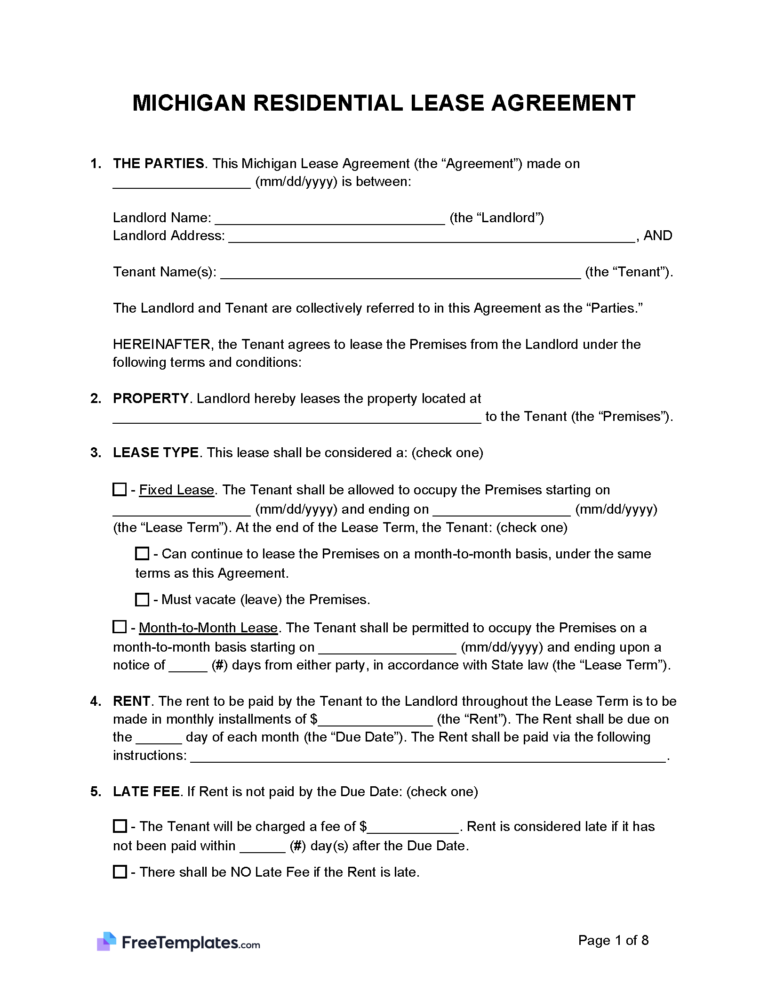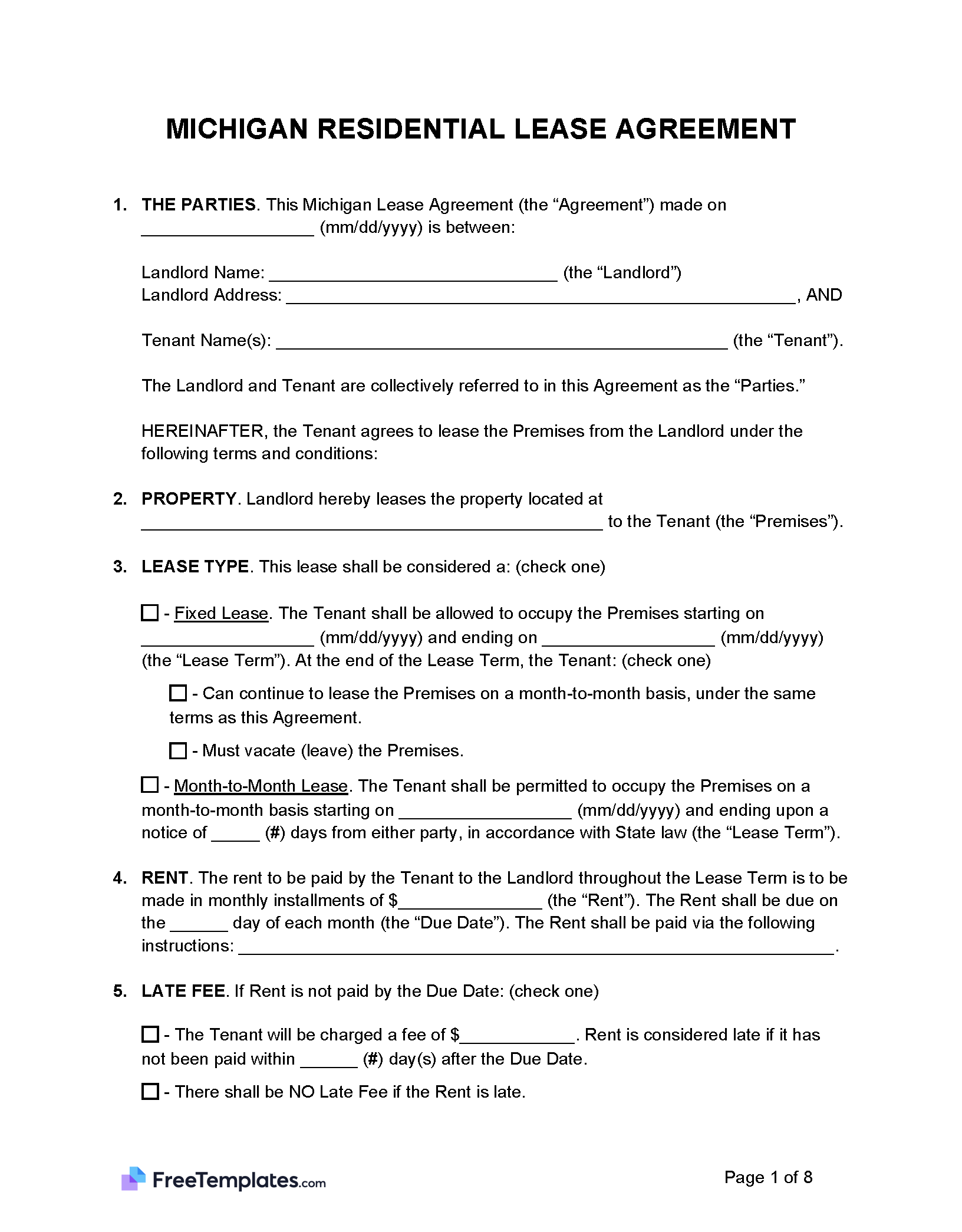By Type (6)
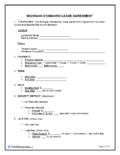 Standard Lease Agreement – A standard rental contract for residential properties for terms typically lasting 12 months. Standard Lease Agreement – A standard rental contract for residential properties for terms typically lasting 12 months. Download: PDF, MS Word, ODT |
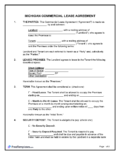 Commercial Lease Agreement – A legally binding document between a business and a landlord or property owner. Commercial Lease Agreement – A legally binding document between a business and a landlord or property owner.Download: PDF, MS Word, ODT |
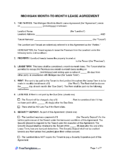 Month-to-Month Lease Agreement – If you have an at-will arrangement, either party can end the tenancy with written notice equal to the time between rental payments. Month-to-Month Lease Agreement – If you have an at-will arrangement, either party can end the tenancy with written notice equal to the time between rental payments.Download: PDF, MS Word, ODT |
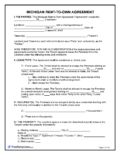 Rent-to-Own Agreement – This legal document outlines the terms and conditions of purchasing a rental property after renting the unit for a disclosed amount of time. It provides a pathway to home ownership. Rent-to-Own Agreement – This legal document outlines the terms and conditions of purchasing a rental property after renting the unit for a disclosed amount of time. It provides a pathway to home ownership.Download: PDF, MS Word, ODT |
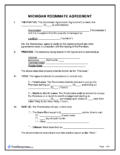 Roommate Agreement – This outlines responsibilities and terms for living together to avoid conflict amongst cohabitants. Roommate Agreement – This outlines responsibilities and terms for living together to avoid conflict amongst cohabitants.Download: PDF, MS Word, ODT |
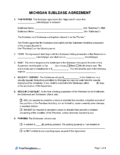 Sublease Agreement – This is when the tenant rents out all or some of the property for a disclosed amount of time that is within the terms of the original lease. Sublease Agreement – This is when the tenant rents out all or some of the property for a disclosed amount of time that is within the terms of the original lease.Download: PDF, MS Word, ODT |
Disclosures (6)
Lead-Based Paint Disclosure – Lead-based paint is a dangerous hazard to residents, particularly children under 6 years of age. Under federal law, landlords must provide informational pamphlets and inform tenants if lead paint is on the property’s interior walls.
Victims’ Rights – The lease must disclose a tenant’s right to be released from their rental lease agreement and their payment obligation with written notice if they, or their child, fear danger from domestic violence, sexual assault, or stalking. Tenants must provide a valid protection order, a probation or parole order, or a police report within 14 days before or after submitting the notice. (MCL – Section 554.601b)
Move-In Inventory Checklist – Upon moving in, the landlord must supply 2 copies of a commencement inventory checklist, including all items owned by the landlord. The tenant shall review the list, detail the condition of the items, and return 1 copy of the checklist within 7 days of moving in. In 12-point boldface font at the top of the first page, the checklist shall contain the following notice: “You should complete this checklist, noting the condition of the rental property, and return it to the landlord within 7 days after obtaining possession of the rental unit. You are also entitled to request and receive a copy of the last termination inventory checklist which shows what claims were chargeable to the last prior tenants.”
(MCL – Section 554.6080)
Legal Notice Address – The landlord must provide the address where tenants can send legal notices. (MCL – Section 554.634(1))
Truth in Renting Act – In 12-point font size or legible print no smaller than 1/8″, the lease must include the following statement: “NOTICE: Michigan law establishes rights and obligations for parties to rental agreements. This agreement is required to comply with the Truth in Renting Act. If you have a question about the interpretation or legality of a provision of this agreement, you may want to seek assistance from a lawyer or other qualified person.” (MCL – Section 554.634(2))
Security Deposit Notice – Within 14 days of moving in, the landlord must give the tenant a written statement including the landlord’s name and address for communication, the name of the bank where the deposit is held, and the tenant’s responsibility to provide a forwarding address after 4 days of moving out. In bold font, 4 points larger than the body, the landlord must include: “You must notify your landlord in writing within 4 days after you move of a forwarding address where you can be reached and where you will receive mail; otherwise, your landlord shall be relieved of sending you an itemized list of damages and the penalties adherent to that failure.” (MCL – Section 554.603)
Security Deposit
Maximum Amount – The landlord may require a security deposit. However, it may not be more than 1.5 months’ rent. (MCL – Section 554.602)
Holding Account – While the landlord is not required to collect interest on the security deposit, Michigan does require it to be held in a financial institution. (MCL – Section 554.604)
Permitted Uses – A security deposit may only be used to reimburse actual damages to the rental premises outside of everyday wear-and-tear, overdue, or future rent owed by terminating the rental agreement early and/or unpaid utility bills. (MCL – Section 554.607)
Returning to Tenant – The landlord has 30 days to return the security deposit balance after subtracting for any permitted uses. If it is used, the landlord must submit an itemized list detailing the estimated cost of the repairs for each item. (MCL – Section 554.609) Failure to provide the notice of damages within 30 days waives the landlord’s right to the security deposit, and they must immediately return the full deposit to the tenant. (MCL – Section 554.610)
Landlord Access
General Access – There is no law in Michigan regarding the landlord’s right to enter the rental premises. To be courteous, landlords should give 24-48 written notice.
Emergency Access – A notice is not needed in the case of emergencies.
Paying Rent
Grace Period – Michigan has no formal grace period for late rent regulated by state law. The rent is due on the date disclosed in the lease agreement.
Maximum Late Fee – The landlord can charge whatever they want for a late rent fee; however, it should be disclosed in the lease contract to prevent disputes.
Returned Checks (NSF) – A landlord can charge a maximum of $25 for a dishonored payment. (MCL – Section 600.2952)
Withholding Rent – If the landlord fails to make repairs, the tenant can either hold their rent payment in an escrow account or pay for the repairs and deduct the cost from the rent payment. (Michigan Legislature – A Practical Guide for Tenants and Landlords)
Reasons for Eviction (2)
Non-Payment of Rent – The day after the lease is due, the landlord can issue a 7-Day Notice to Quit, giving the tenant 7 days to pay the rent in full or move out. (MCL – Section 554.134(2))
Illegal Activity – If the tenant, a household member, or someone under their control engages in certain drug-related activities on the property, the landlord can give written notice to vacate within 24 hours if a formal police report has been filed. (MCL – Section 554.134(4))
